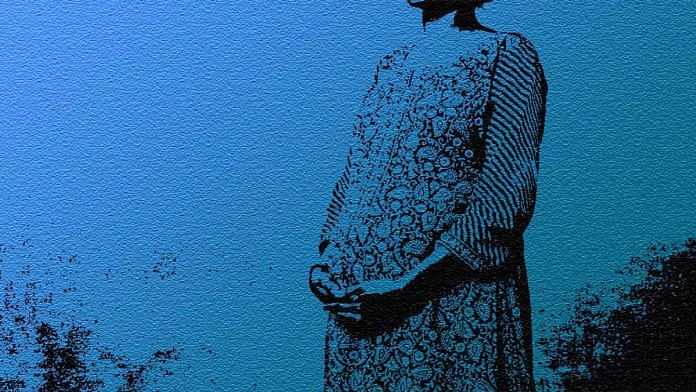New Delhi: Plasma therapy has gained much attention as a potential treatment for Covid-19, but donor eligibility criteria in India contain a blanket bar on donations from women who have ever been pregnant.
This, despite the fact that mothers can donate blood — of which plasma is a component — after a certain period has lapsed since their pregnancy. No such blanket ban exists in developed nations either, where women can donate plasma, subject to the results of a test.
Speaking to ThePrint, doctors in Delhi said the blanket pregnancy bar in India can be traced to certain antibodies that may, on the rare occasion, result in lung damage in the recipients. Understanding the exact reason requires bearing in mind two terms: Human Leukocyte Antigen (HLA) and Transfusion Related Acute Lung Injury (TRALI).
While HLA is a group of proteins found on the surface of human cells that plays an important part in the body’s immune response to foreign pathogens, TRALI is acute distress in the respiratory system that is characterised by hypoxemia (an abnormally low level of oxygen in the blood) and pulmonary edema (excess fluid in the lungs), making it difficult for the patient to breathe.
Also Read: Plasma therapy — 11 trials underway, many Covid ‘cure’ stories but some doubts linger
‘The norm’
Plasma therapy, an experimental cure for Covid-19, is a process that includes taking antibody-rich convalescent plasma from a recovered Covid patient and giving it to a moderately symptomatic patient. It remains under trial, but the success stories associated with the treatment have led to the setting up of plasma donation banks, including in Delhi.
However, not all recovered Covid-19 patients can serve as donors. Guidelines of the Indian Council of Medical Research (ICMR), India’s apex medical research body, as well as the Delhi plasma bank at the Institute of Liver and Biliary Sciences (ILBS), stipulate that eligible donors can’t weigh less than 50 kg or suffer from uncontrolled diabetes or hypertension. Women who have ever been pregnant can’t donate either, they state.
Asked about the latter condition, doctors from private and government hospitals in Delhi said this has been the norm.
“Pregnant women have, since the very beginning, been eliminated from the list of plasma donors. A study published in a British journal established it early on that plasma from multiparous women (who have borne more than one child) showed an incidence of lung disease among 20 per cent of the recipients,” Dr Rahul Bhargav, director of the haematology department in Fortis Memorial Research Institute, Gurugram.
Explaining the science behind this, Dr Meenu Bajpai, head of the blood transfusion department at ILBS, said, “When a woman is carrying a baby, 50 per cent of the baby’s genes belong to the father. The mother develops antibodies to the antigens of paternal origin. As a result, the mother’s body creates antibodies against the HLA of the father.
“HLA antibodies present in the mother do not harm her but when plasma containing these HLA antibodies is transfused to a Covid-19 patient with damaged lungs, the HLA antibodies may lead to an adverse reaction known as TRALI in the recipient.”
There are over 2,500 different types of HLA molecules. Each person has an HLA type that needs to be identified before organ, plasma or stem cell donation. The HLA type of the donor and recipient must ‘match’. The more molecules the two share, the better the match.
If the two do not match, the immune system of the recipient will see the donated organ or plasma as ‘foreign’ and launch an attack.
A US study carried out in 2010 to find a correlation between TRALI and plasma from female donors discovered a “strong association” between the two.
“The risk of TRALI is higher in patients with pre-existing lung damage as is seen in Covid-19 patients,” said Dr Bajpai. “Since Covid attacks the lungs of the patients, plasma donation from women who have ever been pregnant is a strict no-no.”
In countries like the US, prospective plasma donors who have been pregnant are first subjected to a test to detect HLA antibodies.
Asked why a similar strategy can’t be adopted in India, Dr Bhargav said it is “the difference between a developed and a developing country”.
“A Nucleic Acid Amplification Test (NAAT) is conducted to test viruses in blood. This is an expensive, high-intensity test,” he added. “Now, this test is available only in metro cities. If getting a NAAT is so difficult in the country, how can we think of conducting HLA tests for the massive female population of the country?”
Also Read: Dexamethasone, favipiravir, plasma therapy — how India’s Covid care has evolved in 5 months
The ‘exception’
But why does a history of a pregnancy rule women out as donors forever? “Any amount of time that the foetus is borne in the womb indicates the presence of antibodies which can lead to the incidence of TRALI in the recipient. This includes women who have had premature abortion or stillbirths as well,” said Dr Bajpai.
Dr Bhargav said a woman might be eligible if the “pregnancy has been terminated within the first eight weeks of conception, ie, when the foetus hasn’t formed”. “But for the sake of uniformity we follow this as a rule. The minute a woman gets pregnant she immediately becomes unfit for plasma donation,” he added.
Also Read: Plasma therapy: The experimental Covid therapy Delhi Health Minister Satyendar Jain received



